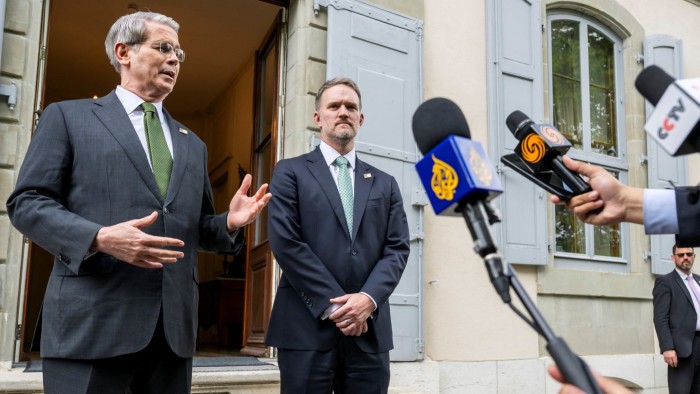Unlock the White House Watch newsletter for free
Your guide to what Trump’s second term means for Washington, business and the world
The US and China have agreed to lower tariffs for the next 90 days in a major de-escalation of the trade war between the world’s two largest economies.
As part of an agreement hammered out in Geneva over the weekend, the US will lower tariffs on Chinese goods to 30 per cent from 145 per cent and China will reduce duties on US imports to 10 per cent from 125 per cent.
Global stocks extended their gains after the announcement, with S&P 500 futures up 2.8 per cent.
The US dollar rallied 0.7 per cent against a basket of its peer currencies while gold, a safe haven asset, fell 2.3 per cent.
“We want more balanced trade, and I think both sides are committed to achieving that,” Scott Bessent, US Treasury secretary, said at a briefing in Geneva on Monday. “Neither side wants a decoupling.”
China released the joint statement with the US simultaneously. “We believe that continued consultations will help resolve issues of concern to both sides in the economic and trade fields,” China’s ministry of commerce said in the statement.
Washington and Beijing have been locked in an escalating trade war since early April, when Trump imposed additional tariffs on Chinese imports, drawing retaliatory measures from Beijing.
The punitive duties have damaged trade between the countries, with Bessent acknowledging last month that the situation was unsustainable.
While the agreement marks just the first step towards reaching a more permanent deal, it represents the first sign of economic tensions easing between the two economic superpowers.
Bessent and US trade representative Jamieson Greer represented the White House in the Geneva talks, with Chinese vice-premier He Lifeng leading Beijing’s delegation.
Ahead of the talks in Geneva, Bessent had warned that the level of tariffs between the US and China amounted to an effective trade “embargo”.
US business leaders including JPMorgan chief executive Jamie Dimon had in recent weeks urged Beijing and Washington to hold talks, as signs of the economic damage from the stand-off mounted.
In a meeting with Trump, the chief executives of Walmart and Target warned that the tariffs would lead to empty shelves in their stores.
But until recently, there were few signs that either country was willing to negotiate, with Beijing officials accusing the US administration of bullying and vowing not to capitulate.
In contrast to increasingly hostile comments particularly from Beijing ahead of the negotiations, both sides emphasised the co-operative atmosphere of the talks and the US held out the possibility of an agreement on stopping the flows of fentanyl precursors from China into the country.
Recommended
“Both the Chinese and United States agreed to work constructively together on fentanyl and there’s a positive path forward there as well,” Greer said.
Beijing’s ministry of commerce said China and the US agreed to “continue to advance related work in a spirit of mutual openness, continuous communication, co-operation and mutual respect”.
Bessent sought to blame the Biden administration for the breakdown in relations with China since the US tariff announcements, saying it had allowed communication channels to atrophy. This was despite the fact that Biden officials had re-established various committees to discuss trade-related matters after the pandemic.
Additional reporting by William Sandlund in Hong Kong



